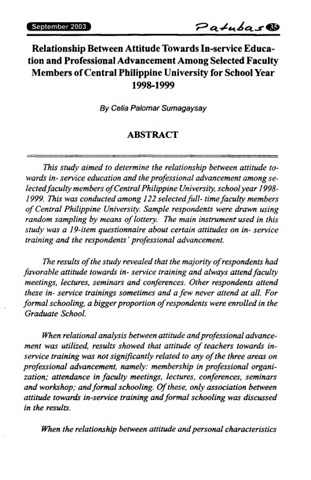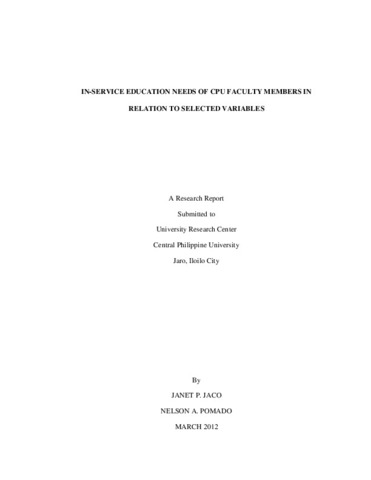Показать сокращенную информацию
TESDA - RTC VI training management system
| dc.contributor.adviser | Balontong, Anrem J. | |
| dc.contributor.author | Macalde, John Jeffrey | |
| dc.contributor.author | Calvo, John Mark | |
| dc.contributor.author | Clarito, Julie Mark | |
| dc.contributor.author | Trabasas, Kelvin | |
| dc.contributor.author | Garino, Raydes Anne | |
| dc.date.accessioned | 2022-08-23T01:45:53Z | |
| dc.date.available | 2022-08-23T01:45:53Z | |
| dc.date.issued | 2016 | |
| dc.identifier.citation | Macalde, J. J. , Calvo, J. M. , Clarito, J. M. , Trabasas, K. & Garino, R. A. (2016). TESDA - RTC VI training management system (Unpublished special paper). Central Philippine University, Jaro, Iloilo City. | en_US |
| dc.identifier.uri | https://hdl.handle.net/20.500.12852/2229 | |
| dc.description | Abstract only | en_US |
| dc.description.abstract | The Technical Education and Skills Development Authority (TESDA) was established to encourage the full participation of and mobilize the industry, labor, local government units and technical-vocational institutions in the skills development of the country's human resources. TESDA is mandated to: integrate, coordinate and monitor skills development programs. The TESDA - RTC VI Training Management System is a system developed and designed to assist the operational needs of the said organization. On the development of the TESDA - RTC VI Training Management System, the researchers used the Feature-Driven Development (FDD) for its methodology. The FDD model allowed the researchers to be able to go through each phase by undergoing the different tasks to be performed and come up with the appropriate goals it must achieve. The TESDA - RTC VI Training Management System is composed of the registration module, status and progress assessment status module, enrollment and assessment module, payment management module, scheduling module and reports generation module. As a conclusion, the study was able to achieve the objectives based on the features provided by the system. All specifications needed by the clients were included and was able to aid the organization on the improvement of their current business process. | en_US |
| dc.format.extent | 185 leaves | en_US |
| dc.language.iso | en | en_US |
| dc.subject.ddc | Filipiniana Theses 004.72 M117 | en_US |
| dc.subject.lcsh | Philippines. Technical Education and Skills Development Authority | en_US |
| dc.subject.lcsh | Vocational education | en_US |
| dc.subject.lcsh | Occupational training | en_US |
| dc.subject.lcsh | Occupational training--Computer programs | en_US |
| dc.subject.lcsh | Management--Computer programs | en_US |
| dc.subject.lcsh | Vocational training centers | en_US |
| dc.subject.lcsh | Vocational training centers--Computer programs | en_US |
| dc.title | TESDA - RTC VI training management system | en_US |
| dc.title.alternative | Technical Education And Skills Development Authority (TESDA) - Regional Training Center 6 training management system | en_US |
| dc.type | Special paper | en_US |
| dcterms.accessRights | Not publicly accessible | en_US |
| dc.description.bibliographicalreferences | Includes bibliographical references | en_US |
| dc.contributor.chair | Calibjo, Cirilo C. | |
| dc.contributor.committeemember | Montaño, Antonio M. Jr. | |
| dc.contributor.committeemember | Pajar, Lennon D. | |
| dc.contributor.department | College of Computer Studies | en_US |
| dc.description.degree | Bachelor of Science in Information Technology | en_US |





